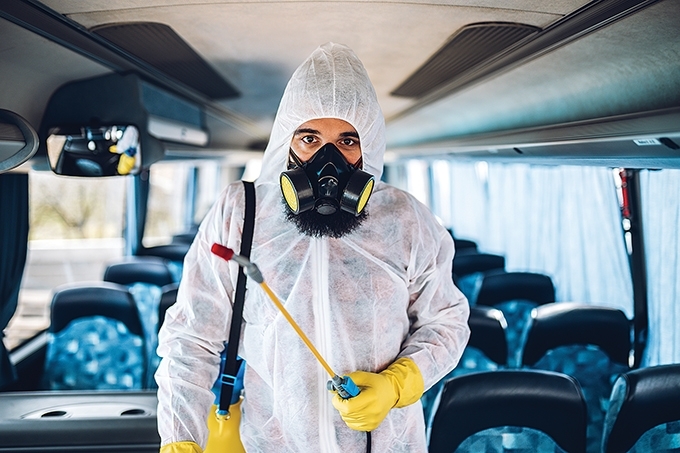
By Richard Tackett
In the wake of the COVID-19 outbreak, safety — and, notably, sanitization — is paramount for bus passengers and transportation. Comprehensive maintenance and safety procedures are critical not only for day-to-day operations, but for the public’s faith in group transportation. The pre-trip vehicle inspection is of greater concern than ever before.
Verifiability is vital to vehicle inspections, whether the mode is public transit, intercity bus and coach, or student transportation. With the newest iteration of its electronic verified inspection report (EVIR®), Zonar said it aims to standardize verifiability of bus inspections to make them safer and ensure that they comply with Federal Motor Carrier Safety Administration (FMCSA) pre- and post- trip regulations and Center of Disease Control (CDC) guidance for sanitization.
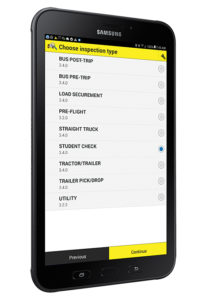 Traditionally, inspection reports fell into two categories. Driver vehicle inspection report (DVIR) is a paper-form system conducted by drivers, noting vehicle condition and any defects. DVIR is limited by its inefficiencies and lack of security (drivers losing forms, for example), and is not verifiable. “Pencil whipping” refers to a report signed by a driver without completing an inspection.
Traditionally, inspection reports fell into two categories. Driver vehicle inspection report (DVIR) is a paper-form system conducted by drivers, noting vehicle condition and any defects. DVIR is limited by its inefficiencies and lack of security (drivers losing forms, for example), and is not verifiable. “Pencil whipping” refers to a report signed by a driver without completing an inspection.
Electronic driver vehicle inspection reports (eDVIR) operates electronically as opposed to requiring paper forms. They offer more efficiency but remain unverifiable. The digital form can still be pencil whipped.
“eDVIR became popular during the massive transition to electronic driver logs,” said Fred Fakkema, vice president, safety and compliance, at Zonar. “It is better than paper, but it still does not truly verify that the driver walked around the vehicle and formed a full inspection.”
How EVIR works
EVIR essentially removes the ability for drivers to pencil-whip inspection reports. The system, available only from Zonar, or NFC tags in inspection zones throughout the bus. Each tag is digitally linked to the vehicle on which it is placed; so, the vehicle is easily identifiable and its inspection information is pre-loaded into the system. Drivers use a Zonar hand held device, tablet or their phone and walk around the vehicle to physically inspect each zone, scanning the tags as they proceed. Scanning a tag initially tells a driver what to inspect, and the second scan verifies that the zone is inspected. If a previous report noted a defect on the bus, the driver is alerted to verify that it has been corrected.
EVIR is compliant with DOT, OSHA, MSHA and PTASP inspection requirements. The system does not allow skipping any step of an inspection, and date / timestamps allow supervisors to verify that inspections are not being performed too quickly.
“An inspection of a typical 11-zone vehicle should take between 10 and 15 minutes,” Fakkema said. “In our experience it takes about 13 minutes on average. Managers know how long inspections should normally take, so this system will allow them to see any red-flags.”
On transit buses, zones typically include the engine, transmission, and gauges; driver controls; brakes and steering; lighting; and vehicle’s exterior. For school buses, the system also includes a Student Check feature – requiring drivers to walk the length of the vehicle to ensure no students are left onboard.
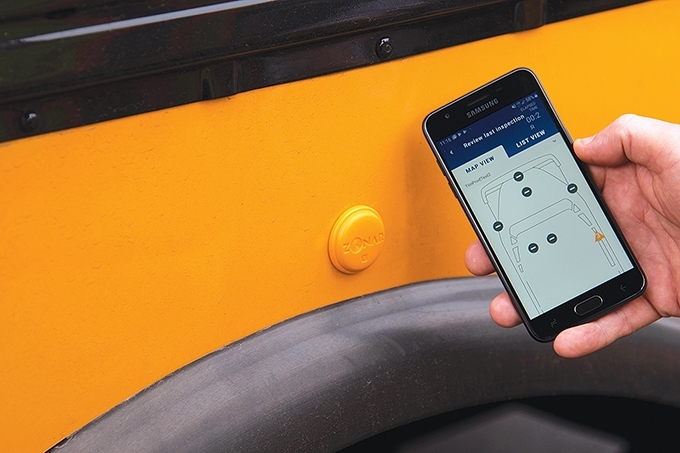
“In this way, we actually verify that drivers are out of the bus and walking around the vehicle,” Fakkema said. “Furthermore, the digital format allows maintenance to maintain the same electronic efficiencies associated with electronic reports and logs. This can streamline inspection processing times by 50 percent or more”
EVIR has evolved significantly since its launch nearly 20 years ago. Originally operated via handheld RFID scanner, the solutions is now available on Zonar tablets – as well as other devices by downloading the app from the Google Play Store.
Fakkema said EVIR automatically uploads inspection results to a secure online portal. It also features Asset Map View, allowing management to view vehicle and equipment locations on a GPS-powered map.

Configurability for COVID-19
For transit and motorcoach managers mobilizing and restarting after the COVID-19 outbreak, Zonar has equipped EVIR with configurations specialized for sanitization. Managers can verify that sanitization procedures are being strictly followed by cleaning crews, following steps outlined by the American Public Transit Association (APTA) standards of best practices and the Public Transportation Agency Safety Plan (PTASP).
Fakkema said EVIR streamlines the vehicle sanitation process for improved productivity while prioritizing cleanliness. It keeps digital cleaning records while eliminating a lengthy paper trail and meets new Federal Transit Administration requirements of documenting specific disinfectants used for vehicle sanitation.
“The system, under this configuration, identifies the exact areas and sanitation requirements of each zone,” Fakkema said, adding that this sets and monitors expectations of how to sanitize areas – and the duration of each task.
“The biggest benefit,” he added, “is that it aids in routine cleaning and disinfection – maximizing efficiency – while simultaneously keep a clean digital record of what was cleaned, who cleaned it, when it happened, and how long it took. That provides maximum oversight and verifiability.”
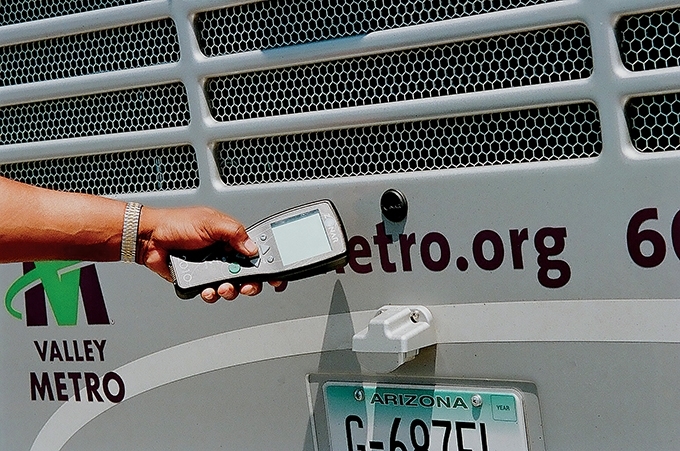
EVIR in action
Fakkema said that numerous agencies and companies of varying size have successfully introduced the patented to their fleets. MV Transportation – the largest privately-owned passenger transportation contracting services firm in the United States – uses EVIR as do transit providers Dallas Area Rapid Transit and Pierce Transit.
Notably, Stout’s Transportation of New Jersey has used the system to great effect in its large fleet of full- and mid-size coaches, while National Express of the United Kingdom is using EVIR in various portions of its U.S. fleet.
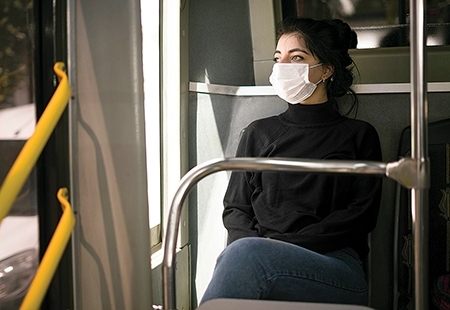 “The system is most impressive because of its configurability,” Fakkema said. “Whether it is adapting to the new needs of transit after COVID-19, or to the unique needs of pupil transportation, EVIR can meet the needs of any transportation provider.”
“The system is most impressive because of its configurability,” Fakkema said. “Whether it is adapting to the new needs of transit after COVID-19, or to the unique needs of pupil transportation, EVIR can meet the needs of any transportation provider.”
Fakkema said that feedback from the system’s true end-users – the bus drivers – has been overwhelmingly positive. Inspections take less time and are easier to track, and drivers appreciate the ability to view a vehicle’s current and past inspection reports.
Furthermore, Fakkema said, fleet managers can rest easy knowing required inspections are done, and that reports are accurate. Most of the positive feedback from managers has been surrounding the EVIR’s ability to streamline inspection audits with easier access to reports online, and that it verifies vital sanitization procedures are followed by cleaning crews.
“On a personal note, I spent 25 years in law enforcement before joining Zonar,” he said. “I am always asked how I ended up at a technology company, and to that I just point to what a system like EVIR does. The verifiable vehicle inspection is a critical part of keeping buses — transit, motorcoaches, and school — safe as they travel down the road. That is a matter of public safety.”
